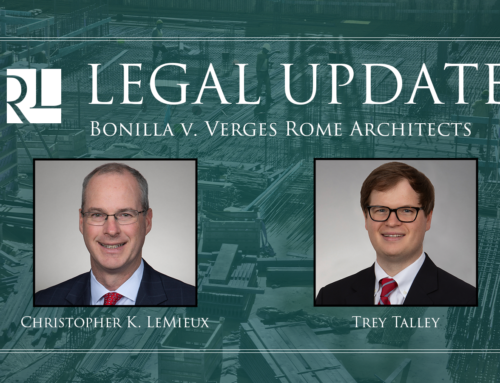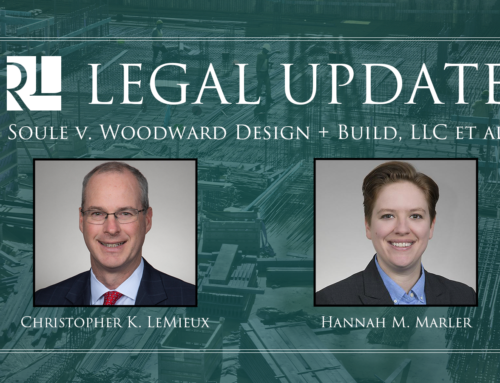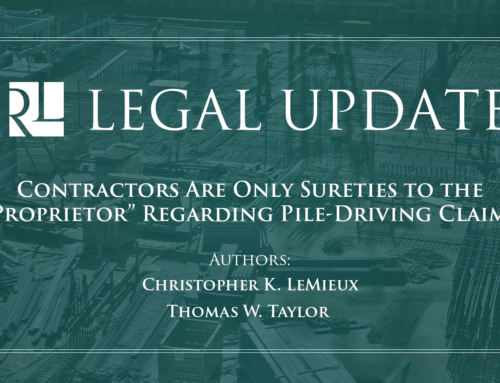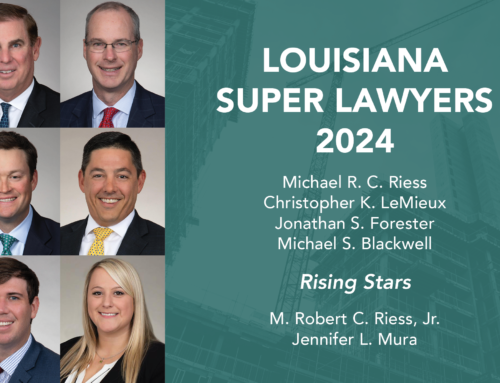In three recent insurance decisions, Louisiana courts again reminded potential claimants of important insurance principles. These decisions addressed (1) claims that may arise out of contractual and delictual (tort) duties; (2) the manifestation trigger theory to determine policy coverage; and (3) the meaning and application of an “occurrence” for CGL coverage.
Contractual and Delictual (Tort) Duties
A plaintiff’s claims that arise out of contractual duties will be deemed one and the same with any alleged delictual duties. In Rain CII Carbon, LLC v. Turner Industries Group, LLC, the plaintiff filed suit against an engineering group for damages resulting from failure to timely deliver equipment. Rain CII Carbon, LLC v. Turner Industries Group, LLC, NO. 19-403 1 (La. App. 3 Cir. 3/18/20). The parties originally entered into a service contract that contained an arbitration provision. When the plaintiff filed suit pursuant to the direct-action statute, the defendant enforced the contract’s arbitration provision. The defendant’s insurer was not joined in the arbitration proceeding but remained in the stayed trial court proceeding. Following the arbitration proceeding, the insurer attempted to dismiss all claims against it at trial. The plaintiff filed multiple amended petitions claiming the defendant’s work did not arise out of the contractual duties, but from negligent performance (continually arguing that the defendant was not bound by contract but by negligent principles). The trial court ruled in favor of the defendant-insurer and the plaintiff appealed.
On appeal, the court focused on whether the cause of action was based in tort or contract, ultimately holding that the action arose out of contract. It reasoned that although it is well recognized that damaged caused by another’s conduct can both arise out of contract or tort, the plaintiff’s claims in this case arose from the defendant’s contractual duties created by the agreement. The duty to perform work at the plaintiff’s facility was based on contract and purchase orders, not separate, delictual obligations. The court further stated: “There are no distinct tortious acts not otherwise included in the general duties provided by contractual law.” Thus, the court affirmed and ruled in favor of the insurer.
Manifestation Trigger Theory
CGL coverage is triggered when the damage manifests itself and is discovered during the policy period, not when the causative negligence took place. In Anderson v. Laborde Const. Ind., L.L.C., the plaintiff filed suit against multiple contractors and subcontractors for property damage and personal injuries arising from defective construction. Anderson v. Laborde Const. Ind., L.L.C., 2019-0356, 2 (La. App 1 Cir. 3/12/20). The plaintiff later amended to include multiple insurance companies for the contractors. Each of the insurers filed crossclaims against each other. One particular insurer, AXIS, filed for summary judgement claiming that there was no policy coverage during the time the claim arose. The trial court granted summary judgment and the two other insurers appeal.
On appeal, the insurers argued that the dismissal of the claims against AXIS were in error because there was an issue of material fact as to whether damage manifested during the Axis policy period. The court stated that “Trigger of Coverage” is an event or condition that determines whether a policy responds to a specific claim. When alleged damage or injury is latent or has a delay in manifestation, Louisiana courts apply the manifestation trigger theory, which states “coverage is triggered when the damage manifest itself and is discovered during the policy period, not when the causative negligence took place.” For third-party CGL claims, the defective construction itself does not trigger coverage under the CGL policy, but the coverage is triggered when the defect causes damage to the property. The court held that a genuine issue of material fact existed as to whether the trigger of coverage occurred during the effective date of AXIS’s policy. Thus, the court reasoned that summary judgement was improper until the material issue of fact is resolved.
Occurrence
An “occurrence” may be defined as an accident, including continuous or repeated exposure to substantially the same general harmful condition. In Gibbs Const., L.L.C. v. National Rice Mill, L.L.C., the plaintiff filed suit against the contractor and their insurers for damage resulting from faulty masonry work. Gibbs Const., L.L.C. v. National Rice Mill, NO. 2019-0665, 1 (La. App. 4 Cir. 3/18/20). The first insurer, Westchester, issued a CGL policy with policy periods from February 1, 2011 to February 1, 2012 and February 1, 2012 to February 1, 2013. The second insurer, Fireman’s Fund Insurance, provided excess liability insurance during the applicable period. During the construction of the masonry work outside the building, two storms caused water intrusion into the building. The plaintiff filed suit to recover damages. Fireman’s Fund filed a motion for partial summary judgment to have the court declare two separate weather events occurred resulting in two occurrences under the policy. The trial court granted the insurer’s motion.
On appeal, the plaintiff argued that there was a single occurrence (the continuous and repeated water intrusion form the same harmful conditions in the masonry) that triggered the excess liability insurance. The court found the policy will pay for damages per occurrence. Thus, the court had to determine (1) whether there was an occurrence; (2) if so, was there one or two occurrences; and (3) which policy was triggered. After reviewing the case law, the court concluded that the defective masonry was considered an occurrence under the policy. The court further held that there was a single plaintiff and single occurrence as defined by the policy, which was the continuous or repeated exposure to the alleged defective masonry restoration that resulted in the property damage. Thus, the court found the first CGL policy was triggered under a single occurrence and the partial summary judgment was granted in error.



